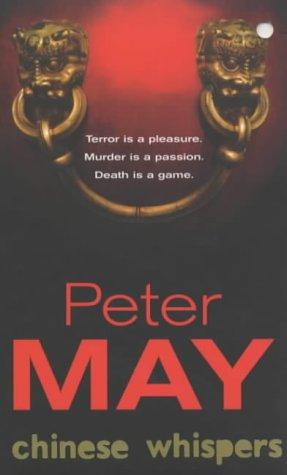Two Charlie Chan successors
A Beijing dick and a New York gumshoe
By Mark Schreiber
A version of this review appeared as
"Beijing Ripper goes chop-chop; New York whodunit has a rap" in
The Japan Times, The Asian Bookshelf, 18 April 2004
Dean Barrett,
Murder in China Red, 2003
Peter May, Chinese Whispers, 2004
Honolulu Detective Charlie Chan made his literary debut in Earl Derr Biggers' 1925 novel "The House Without a Key." A decade later Chan had become a favorite among B-movie audiences for his quaint aphorisms ("Fingerprints very valuable if detective can catch owner of fingers"), and today, eight decades on, Chinese cops continue to delight mystery enthusiasts.

A ring of authenticityPeter May Out now is Scottish author Peter May's latest work, the sixth title in his Beijing series begun in 1999. May's works combine the standard police procedural and ethnic detective techniques. His two regulars are Li Yan, head of Beijing's serious crime squad, and Margaret Campbell, Li's American lady love, who also happens to be a forensic pathologist and who, at the request of the U.S. Embassy, performs autopsies on Americans who manage to get themselves killed in Beijing. Li and Margaret live together with their infant son but can't wed -- apparently China prohibits its police officials from marrying foreign nationals. In "Chinese Whispers," Beijing finds itself with a serial murderer determined to emulate the work of 19th-century London's Jack the Ripper. The killer is not merely a copycat in the sense of mutilating victims who happen to be prostitutes; he actually carves them right down to each flayed bit of flesh and missing internal organ -- an effort, we learn, rendered possible by the recent publication of the Chinese translation of a historical work that includes the forensic autopsy reports on Jack's victims. May's descriptions of Beijing and its denizens are well researched, and he adds some interesting twists, such as descriptions of Chinese efforts to modernize police methods via DNA testing, polygraph (lie detector) testing and a new technology called MERMER that is said to be virtually fail-proof at uncovering fibs. It is during a demonstration of the latter that the criminal, fearing exposure, is driven to kill the Chinese-American woman who has administered the test to six important officials, including Li. Which one is guilty, and can he be the same man carving up prostitutes? Li's task is made difficult by an influential enemy who appears determined to thwart his investigation at every turn. In rapid succession, Li is put on suspension; the immigration office informs Margaret that she must leave the country; his sister is arrested for possession of cocaine; and to add insult to injury, his credit card is canceled. Still, 21st-century Beijing is hardly 19th-century London, and a skeptic might complain that certain portions of the narrative stretch the reader's credulity. Or maybe not. Time magazine of Nov. 24, 2003 reported "It has become harder to track and catch . . . perpetrators. Until recently, Chinese were required to have a hukou, or residence permit, for the community in which they lived. China may be less of a police state now, but that may be at a cost of becoming a more violent society." Even if a bit implausible at times, "Chinese Whispers" carries a ring of authenticity and just the right touch of dramatics, as Li, the dedicated cop, contends with overbearing bureaucratic bosses to crack the case. |

A self-styled ChinamanDean Barrett Liu Chiang-hsin's business card bears the consummately politically incorrect name "Chinaman." He is a Beijing-born naturalized American and a former creative writing teacher who operates a one-man investigation agency in New York. Amazingly, he's a relatively normal person -- not able to levitate or perform super martial arts stunts. But he's fearless and good at keeping his cool, a talent that comes in handy to bluff his way out of trouble. Liu appears to have learned his style of discourse from Gangsta Rappa rather than Charlie Chan. When a large and very tough black man threatens him in a Harlem drinking establishment by asking, "You think you're the only one in this bar got a gun?" Liu responds: "Nope. . . . I think I'm the only one in this bar who has the barrel of a fully loaded Smith & Wesson .38 Special pointing right at your pecker. And if I . . . for whatever reason apply . . . pressure on this trigger, what once provided your lady love with hours of rapturous joy is going to sail across Amsterdam Avenue like an unlit cigar." Liu is usually broke, and it doesn't help that he's working this case for free. It seems a mysterious German visitor to the city is murdered in his hotel by a team of hit men. Liu's lady friend, an aspiring actress turned call girl, by unfortunate coincidence happened to be visiting the German's room at the time of the assault, and thus became collateral damage. Liu is determined to avenge her. Dean Barrett, according to his biographical data, speaks Chinese and spent two decades in Asia. While this Big Apple whodunit metamorphoses into a tale of international intrigue, there's almost nothing in the book involving China -- which, to this reviewer, stands out as something of a mystery in itself. |